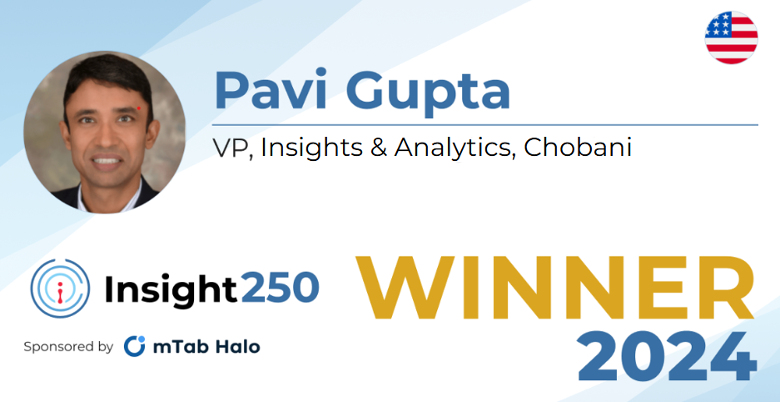How AI is Transforming Insights
Pavi Gupta is VP Insights & Analytics at Chobani and a three-time Insight250 Winner. With 25+ years of experience at major companies, he discusses the impact of AI on the insights industry.

Article series
Insight250
- The importance of business sense in research
- The role of humour in effective leadership
- The importance of ethics
- The importance of disruption in innovation and leadership
- The importance of Disruption in Innovation and Leadership Part 2
- The importance of Diversity & Inclusion
- The impact of colour
- Communicating insight with impact
- Insights on leadership, culture and polling
- The evolution of electric vehicles
- 2022 Top tips (part 1)
- 2022 Top tips (part 2)
- Maximising the potential of data
- The importance of flexible working
- Winners
- The importance of advanced analytics
- Judges for the 2022 Insight250 Awards announced
- The evolution from social listening to digital intelligence
- The Judges' Perspective
- The judge's perspective - part 2
- Insight Climate Collective
- Insights technology
- Understanding employee ownership
- Global insight perspectives
- Top Tips from our Leaders and Innovators
- The Evolution of Insights in the Food & Beverage Market
- The Evolution of Insights in CPG
- Neural Mechanisms Behind Consumer Decision-Making
- Celebrating and Elevating the Insights Industry
- The State of the Insights Industry
- Opportunities, challenges and threats that AI presents
- 2024 Insight250 Winners Announcement
- Connecting Brands and Consumers Through Insights
- The Importance of Human Insight and Attention
- The Elevating Role of Insights with Technology Innovation
- Haleon’s Insight Expert on Consumer Healthcare
- Insight from the Insight250: How AI is Impacting Qualitative Research
- How AI Tech is Doing the ‘Heavy Lifting’ for Insights
- Reviewing the top tips for 2025
- Google's Sarah Ashley on AI and revolutionising insights - Insights from the Insight250
- Beyond BI: The Future of Decision Intelligence for Insight Professionals
- The Advancement & Impact of Insights - An Insight250 Winners Series perspective with David Smith
- International Jury for the 2025 Insight250 Awards Announced
- Newly elected President, Anne-Sophie, on Revolutionizing the Impact of Insights
- Haleon's Litthya Baez on Enhancing Healthcare with Insights - Insight250 Winners Series
- Understanding the Insights of Consumer Decisions
- Moving Beyond Dashboards to Deliver Decisions with AI
- How AI is Transforming Insights
- How AI is Transforming Insights
- Five Years of Insight250: Elevating the Insight Industry
The Insight250 spotlights and celebrates 250 of the world’s premier leaders and innovators in market research, consumer insights, and data-driven marketing. The awards have created renewed excitement across the industry whilst strengthening the connectivity of the market research community. Winners of the 2024 Insight250 were announced this past September - you can see the full list of Winners at Insight250.com. The 2025 award winners are in the process of being selected now.
With so many exceptional professionals named to the Insight250 we regularly tap into their expertise and unique perspectives across various topics. This regular series does just that: inquiring about the expert perspectives of many of these individuals in a series of short topical features.
With technology advancing at an incredible pace and the value of insights ever increasing, I sat down with a multi-time Insight250 Winner Pavi Gupta, VP Insights & Analytics for Chobani. Pavi has won the award in 2021, 2022 and 2024 - congratulations. Pavi oversees insights for Chobani, focusing on championing data-insights strategy to drive business impact. He has 25+ years of experience in insights, analytics and data science, having worked at The Coca-Cola Company, Kantar, Johnson and Johnson, and SC Johnson across US, Thailand & India markets. He’s also presented at ESOMAR’s Congress & Client Summit. Pavi goes into great depth on a number of insightful topics around the challenges, warnings and opportunities AI is presenting to the insights industry.
Crispin: Pavi, you’ve worked at leading client-side brands such as The Coca-Cola Company, J&J, SCJ, and now Chobani. You’ve also worked globally, in India, Thailand and the USA and at an agency (Research International). Are there differences in how insights are used between organisations and continents?
PG: Insights is a fungible function. The audiences might change, but the basic tenets remain the same. Of course, these organizations are wired differently, given their geographic footprint, portfolio, and business model. Understanding the decision-making process and workflow is critical to succeed; this intelligence goes a long way to drive impact by monetizing insights effectively.
Crispin: The newswires are clogged at the moment with everything AI. Is the adoption of AI within Insights making our sector cool or fools?
PG: I feel (like every other domain) we are very early in this journey. I do worry that in the quest to be cool, we risk making a fool of ourselves. I am convinced that ‘AI’s cool factor’ is driving unintended consequences. We cannot let FOMO drive our AI strategy.
In the quest to not be left behind, companies have a sense of urgency to jump-start their AI journey. The biggest risk of diving in without thinking deeply about the problem at hand can end up creating a problem instead of solving it. Einstein famously said, (am paraphrasing here) “if there is an hour to solve a problem, he would invest 55 minutes thinking about the problem and 5 minutes in solving it”. The way AI works is totally inverted. Algorithms are written to solve the problem, not to analyze them per se.
Crispin: What role do you believe AI can play in transforming how we gather Insights?
PG: I believe that we need to embrace AI wholeheartedly. However, we need to be smart and responsible about how we use it. I talk a lot about the “Power of AND”: AI & Human Intuition together will unlock value. Blindly applying AI by itself isn't just ineffective, it could lead to wrong conclusions.
Let me illustrate this with an example that might be somewhat controversial: if you have a hard-to-reach audience (low sample size), then creating digital twins/synthetic data risks creating the illusion of rigor. Instead of pretending that we have rich and robust quantitative data (just because the algorithm cleverly generates synthetic data), we might be better off leveraging the data qualitatively along with your gut instinct. Don’t get me wrong, synthetic data has its value when used responsibly, but merely boosting low sample create make-belief scores is probably a weak application.
Crispin: Is there a specific insights framework for leveraging AI?
PG: I have a two-by-two grid that I firmly believe in. It helps us frame where to focus our AI efforts. It is based on the principle of leveraging AI to augment not to merely automate.
The x-axis ranges from known to unknown spectrum, while the y-axis moves from intuitive to counter-intuitive. The bottom left is the known and intuitive quadrant. I call these Validatory Insights. These typically account for close to 80% of time, effort and investment. AI can play the greatest role in this immediately by developing solutions to interrogate our existing knowledge. This will free up time to explore the unknown & counter-intuitive areas - which needs a mix of art and science.
Crispin: How might we leverage AI strategically?
PG: To leverage AI strategically, we need to be very focused on impact based on our business context. The focus needs to be on the greatest pain point/friction, we need to factor in tech feasibility and most importantly, identify areas where business stakeholders will embrace the new solution.
Change management is the key, and the Insights teams need to leverage their understanding of basic human psychology to identify the barriers to adopting AI.
I often tell the team, our work shouldn’t end by delivering insights, rather it should start by working relentlessly to drive impact. We need to take greater ownership of understanding what will move the organization to leverage the solutions and/or the insights we are providing.
Crispin: Is AI commoditizing knowledge? Can human insights add value?
PG: With AI driving data democratization, knowledge will continue to get commoditized. Insights can add a lot of value by tapping into human curiosity that will help us move from the ‘what’ to the ‘so what’ and ‘now what’. This is how we can add value to the organization.
Crispin: As we start becoming more dependent on AI in everything we do, what are the big watch-outs for all of us?
PG: The big watchout is to understand the limitations of the technology itself. As an example, recognize the fact that our solutions might be built on data with inherent bias(es). We need to use AI responsibly with clear guardrails and the right oversight/governance (also referred to as human in the loop). We shouldn’t lose sight of the fact that the best insights blend art and science. Human understanding is critical, which is why AI should be used to drive augmentation.
Crispin: What advice do I have for people starting a career in insights today?
PG: Rekindle your innate curiosity. As you understand and master the usage of AI, single-mindedly focus on solving business needs. Remember that the power of AND - AI & Human Intuition will unlock growth.
HOT TOPIC: DEI seems to be out of fashion in some quarters; do you believe it is still important for our sector and if so, what more should we be doing?
PG: I’ll explain this through a data analogy. A model built on data with greater variance is far more powerful than data that is very homogeneous. Likewise, most of us should recognize the advantages of celebrating diversity, encouraging inclusiveness, and striving for equity. We need to focus on this outcome while recognizing that sometimes there are differences in opinion on how to go about bringing this change.
TOP TIP
Crispin: What's your top tip to be a leader & innovator in our profession?
PG: Our superpower is Curiosity. We must continue to find ways to unleash it. While a lot of the work that’s done right now will become automated and agentic, nothing can replace human inquisition. Challenge yourself to be more curious - it will help you learn faster, remember better, and give you a competitive edge from “agentic systems.”
Crispin: Pavi, thank you for sharing your insightful perspective based on your extensive experience on the opportunities and risks AI is presenting to insights. It’s exciting to hear your thoughts based on your diverse experience and how it has provided you with such a unique perspective on the evolving role of technology and its impact on market research.

Crispin Beale
Chairman at QuMind, CEO at Insight250, Senior Strategic Advisor at mTab, CEO at IDXCrispin Beale is a marketing, data and customer experience expert. Crispin spent over a decade on the Executive Management Board of Chime Communications as Group CEO of leading brands such as Opinion Leader, Brand Democracy, Facts International and Watermelon. Prior to this Crispin held senior marketing and insight roles at BT, Royal Mail Group and Dixons. Crispin originally qualified as a chartered accountant and moved into management consultancy with Coopers & Lybrand (PwC). Crispin has been a Board Director (and Chairman) of the MRS for nearly 20 years and UK ESOMAR Representative for c15 years. As well as being CEO of Insight250, Crispin is currently Worldwide CEO of Digital Communications Solution Agency, IDX. Crispin is also the Senior Strategic Advisor at mTab and the Chairman of QuMind and spent 4 years as Group President of Behaviorally where he was responsibile for the client & commercial teams globally. Crispin is a passionate advocate for blending human intelligence and technology to deliver innovation and leadership across organisations.
Article series
Insight250
- The importance of business sense in research
- The role of humour in effective leadership
- The importance of ethics
- The importance of disruption in innovation and leadership
- The importance of Disruption in Innovation and Leadership Part 2
- The importance of Diversity & Inclusion
- The impact of colour
- Communicating insight with impact
- Insights on leadership, culture and polling
- The evolution of electric vehicles
- 2022 Top tips (part 1)
- 2022 Top tips (part 2)
- Maximising the potential of data
- The importance of flexible working
- Winners
- The importance of advanced analytics
- Judges for the 2022 Insight250 Awards announced
- The evolution from social listening to digital intelligence
- The Judges' Perspective
- The judge's perspective - part 2
- Insight Climate Collective
- Insights technology
- Understanding employee ownership
- Global insight perspectives
- Top Tips from our Leaders and Innovators
- The Evolution of Insights in the Food & Beverage Market
- The Evolution of Insights in CPG
- Neural Mechanisms Behind Consumer Decision-Making
- Celebrating and Elevating the Insights Industry
- The State of the Insights Industry
- Opportunities, challenges and threats that AI presents
- 2024 Insight250 Winners Announcement
- Connecting Brands and Consumers Through Insights
- The Importance of Human Insight and Attention
- The Elevating Role of Insights with Technology Innovation
- Haleon’s Insight Expert on Consumer Healthcare
- Insight from the Insight250: How AI is Impacting Qualitative Research
- How AI Tech is Doing the ‘Heavy Lifting’ for Insights
- Reviewing the top tips for 2025
- Google's Sarah Ashley on AI and revolutionising insights - Insights from the Insight250
- Beyond BI: The Future of Decision Intelligence for Insight Professionals
- The Advancement & Impact of Insights - An Insight250 Winners Series perspective with David Smith
- International Jury for the 2025 Insight250 Awards Announced
- Newly elected President, Anne-Sophie, on Revolutionizing the Impact of Insights
- Haleon's Litthya Baez on Enhancing Healthcare with Insights - Insight250 Winners Series
- Understanding the Insights of Consumer Decisions
- Moving Beyond Dashboards to Deliver Decisions with AI
- How AI is Transforming Insights
- How AI is Transforming Insights
- Five Years of Insight250: Elevating the Insight Industry


